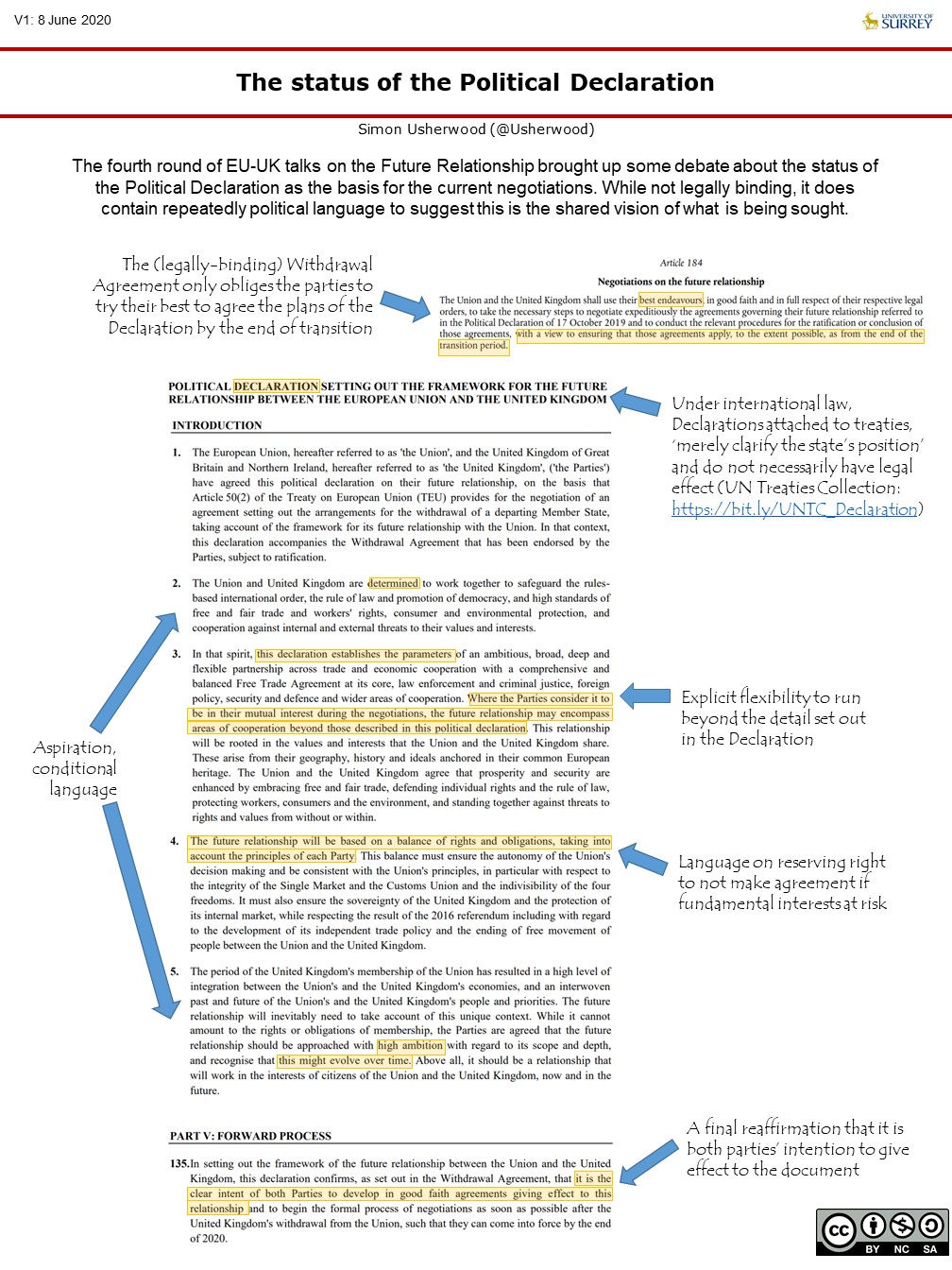
In the Groundhoggery of the Brexit process, we find ourselves once more at the stage of discussing whether what’s come before matters or not.
More specifically, there is an argument made in some quarters that since the Political Declaration isn’t legally-binding, it doesn’t impose any limits on the current Future Relationship negotiations.
This argument often comes from the same people who complain that the other party in the negotiations isn’t sticking the Political Declaration, but that’s another matter.
Earlier this week, I tried to put together some thoughts on this question, in the graphic above (part of my on-going collection).
While indeed the Declaration is not legally binding, it is still a document of political weight.
At the simplest level, consider that it exists at all: if it were pointless, then why bother to create it?
Yes, it was the UK government that pushed for it, to show Tory backbenchers that the costs of the Withdrawal Agreement were worth it for a brighter tomorrow. And yes, many of those backbenchers did not buy that, because it had no legal force.
But still it was written and agreed.
As you can see from the text above, the Declaration is a statement of firm intent, backed up by the ‘best endeavours’ requirements of Art.148 of the Withdrawal Agreement to negotiate. While a commitment to negotiate is not the same as a commitment to agree, if we take this all as a package, then it’s clear that both parties signed up to this process in very explicit terms.
And this is where the issue now lies.
Because the Declaration is part and parcel of the Brexit process – in the broader sense – actions regarding it reflect on intentions and actions elsewhere in the process. To reject any weight from a document signed less than six months ago, when there has been no change of government, no change of formal government policy and no fundamental change of circumstances – strange as it might seem, Covid-19 isn’t one – is a difficult position to hold for the British government.
If one is not serious about one’s political commitment ‘because we’re not legally bound to’, then at the very least it will make you very determined to make sure any future deal is legally watertight.
That means questions on the Level Playing Field will require robust legal systems to ensure compliance, rather than simple assurances that it’ll be alright.
It means that you’ll want to have a standing framework for fisheries access now, because you can’t be sure what will happen in annual rounds of negotiation.
And it means you’ll demand much more robust evidence of compliance on equivalence standards, because you’ll worry about backsliding down the line.
Worse, all of these pressures to harden the EU line are reinforced by the UK’s further mutterings about those things that are undoubtedly legally-binding.
While there is now a document on implementing the Irish Protocol, it lacks much detail or operationalisation. Even in the smoothest of situations, the six months left to get this up and running would be the tightest of processes, for building infrastructure, recruiting and training staff, putting in place legal regulations, and the rest.
To put this into simple terms, the law and politics are intertwined. Your actions in one affect how you are seen in another.
For all the talk of ‘good faith’ in these talks, the British wriggling – both real and perceived – on the Declaration has only made it harder to maintain the potential space for working through the issues currently in hand in the Future Relationship talks.
You don’t need to be religious to accept that the Golden Rule applies here: treat others as you’d have them treat you. To expect to be trusted when you act in a distrusting way is a fool’s errand.
